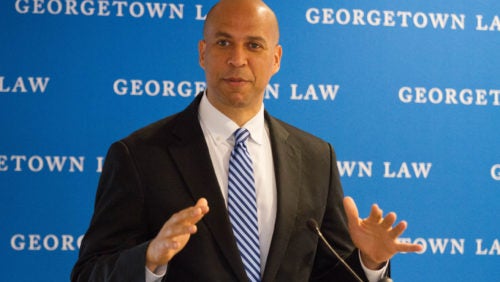Senators Cory Booker, Tina Smith Talk Access to Medicines
July 3, 2018

Senator Cory Booker (D.-N.J.) discusses health care as a human right at a conference on access to affordable medicines at Georgetown Law on June 28.
“This is not a time to curl up, to shut up, to give up — it is a time to stand up, to speak up, and to rise up…” Senator Cory Booker (D.-N.J.), said, speaking at Georgetown Law on June 28.
“What Frederick Douglass said years ago is 100 percent true — if there is no struggle, there is no progress. [When] I think about all the great struggles for justice in our country’s history, it wasn’t a bunch of men standing around in Washington deciding, ‘You know what? It’s about time that women get some rights to vote. [African Americans] deserve some civil rights.’”
Powerful words — at a conference on affordable medicine sponsored by the nonprofit consumer rights advocacy group Public Citizen and held at Georgetown Law. Why talk about the history of civil rights when talking medicine? Because to many in the room including Booker, health care is a human right.
“You cannot have life, liberty and the pursuit of happiness without health coverage,” Booker said. “Health care is a right — health care is a right — health care is a right…. What justice is there if families in my community literally cannot afford to buy their prescription drugs?… We have a nation that is doing things so backwards that we would rather pay so much more [in] cost by not affording people health care than by affording people health care in the first place.”
In his 30-minute speech, Booker spoke of strategies to drive down the cost of medicines. A friend, he noted, once paid approximately $8000-$9000 a year for a medicine that now costs $150,000 a year. “These kinds of practices shouldn’t be allowed in the United States of America. We have the power to hold these companies to account. We have the power to change this reality.”
Booker also spoke of the impending retirement of Supreme Court Justice Anthony Kennedy. “[The next] Supreme Court justice will tip the balance of [a Court that] since from the time I was born, and before that…was expanding rights, was protecting individual rights, was expanding women’s rights and civil rights and LGBTQ rights…workers’ rights. Now that balance could shift in a dramatic fashion.”
One of the newest members of Congress, Senator Tina Smith (D.-Minn.), discussed legislation to increase access to medicines and disputed arguments that high prices are necessary because of middlemen and investment/innovation. “We have got to hold the big drug companies accountable for the prices that they set — basically whatever price they want.”
Incentivize
Matthew Kavanagh, visiting professor and the program director of Global Health Governance and Policy Initiative at the O’Neill Institute for National and Global Health Law at Georgetown Law, spoke on a panel providing perspectives on the movement for affordable medicines.
“This is not a situation where it’s likely that we can win with brilliant arguments,” Kavanagh said. Looking at how change happens, he pointed to activists in India who made sure that the country’s laws reserved control over the granting of drug patents while still complying with international IP law.
When patent legislation came up, activists “literally…got in a car and [went to] a bunch of legislators and said, don’t do what the United States government is suggesting, don’t do what the pharmaceutical industry is suggesting, instead, here’s some alternative language…” he said.
“Because of that…they were able to push the drug companies to make [the HIV drug Tenofovir] more affordable, they were able to [challenge the patent], and they were able to build campaigns [so that] the pharmaceutical company brought down the price, a number of companies hopped in and an entire government supported the push to make it available. Those opportunities come up and are available and we can be smart about them, but they don’t come up just because we’re around.”
The access to medicines conference was supported by the O’Neill Institute for National and Global Health Law, which believes that the law has been, and will remain, a fundamental tool for solving critical health problems in our local, national, and global communities.